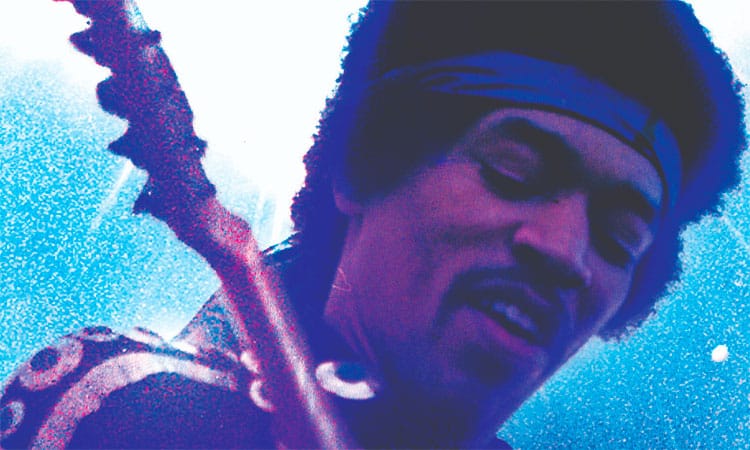The film will screen in Look Dine-In Cinemas on October 25th
The Grammy-nominated documentary Music, Money, Madness… Jimi Hendrix In Maui makes its debut theatrical screening on Wednesday, October 25th at 7:15 pm at Look Dine-In Cinemas W57, located at 657 W. 57th Street in Manhattan. The screening is presented by Experience Hendrix, LLC, The Coda Collection and Abramorama, in association with Legacy Recordings.
Following the showing, there will be a Q&A session with the film’s co-producer Janie Hendrix and director John McDermott, as well as original Hendrix audio engineer Eddie Kramer, with an in-depth look at the making of the documentary. The event will be moderated by iHeartRadio on-air personality Jonathan “JC” Clarke, heard daily throughout the NYC/tri-state area on Q104.3 and 106.7 Lite FM.
Nominated for Best Music Film at the 2023 Grammy Awards, the feature-length documentary chronicles the Jimi Hendrix Experience’s storied visit to Maui in 1970, and how they became ensnared in the controversial, counterculture film Rainbow Bridge. Co-produced by Janie Hendrix, George Scott and John McDermott, who also directed the film, Music, Money, Madness… Jimi Hendrix In Maui incorporates never-before-released original footage and new interviews with firsthand participants and key players such as bassist Billy Cox, recording engineer Eddie Kramer, Warner Bros. executives and several Rainbow Bridge cast members, as well as its director Chuck Wein. Their fascinating accounts tell the definitive story about what is arguably one of the most controversial independent films ever made.
By the middle of 1970, Jimi Hendrix was working on a follow-up album to Electric Ladyland with band-mates Mitch Mitchell (drums) and Billy Cox (bass). Simultaneously, Hendrix was headlining festivals and arenas across the US with his band, and building Electric Lady Studios in Manhattan’s Greenwich Village. Completing this state-of-the-art recording facility was proving to be a costly endeavor, so his manager Michael Jeffery procured a $500,000 advance from Warner Brothers to fund the remaining construction of the studio. Jeffery also convinced Warner executives to finance a film called Rainbow Bridge, in exchange for rights to its soundtrack album consisting of new Jimi Hendrix studio recordings. The film was to be shot in Maui.
Inspired by Easy Rider and directed by Warhol acolyte Chuck Wein, Jeffery’s film centered around the idea of a “rainbow bridge” between the unenlightened and enlightened worlds. It was envisioned to feature everything from surfing and yoga to meditation and Tai-Chi and filmed without the aid of a script or professional actors. What emerged proved to be a rambling assemblage of hippie excess and Jeffery grew concerned that his investment was being squandered. The Experience was already booked to perform a concert in Honolulu at the HIC Arena on August 1, 1970. Chuck Wein, desperate to feature Hendrix in some capacity within the film, devised a plan to film a free ‘color/sound vibratory experiment’ on the lower slope of the dormant Haleakala volcano. Word of mouth about a free Jimi Hendrix concert led a few hundred curious Maui locals to the Baldwin cattle ranch in Olinda where a makeshift stage was constructed and the audience was arranged by their astrological signs. The performance was a success – the trio was at the height of its powers and played two sets flawlessly against a stunning natural backdrop.
In the aftermath of his performance on Maui, Hendrix would return to New York and his work at Electric Lady Studios. He had no further involvement in Rainbow Bridge. Hendrix traveled to Europe at the end of August to headline the massive Isle Of Wight festival and begin a European tour. Tragically, he would die in London on September 18, 1970.
The Cry Of Love, the first album of posthumous Jimi Hendrix recordings, was issued in 1971 to wide commercial and critical acclaim. Jeffery readied Rainbow Bridge and its accompanying soundtrack to be the next release. Despite its Hendrix association, the film was a commercial failure. Rainbow Bridge confused moviegoers, many of whom were under the impression they were going to see a concert film. A scant 17 minutes of haphazardly edited Hendrix concert footage was used in the final cut, and this was the film’s saving grace. Due to technical problems inherent in the original recording of the Maui performances, Mitch Mitchell had to overdub his drum tracks at Electric Lady Studios in 1971 in order for those performances to be featured. Music, Money, Madness… Jimi Hendrix In Maui incorporates much of the unused footage in its telling of this strange moment in pop culture.
The Blu-ray for Music, Money, Madness… Jimi Hendrix In Maui is also contained in a package that pairs it with The Jimi Hendrix Experience Live in Maui 2 CD/3 LP – the complete audio recordings of both July 30, 1970 live performances. Released in November 2020 by Experience Hendrix and Legacy Recordings, every second of existing concert footage from that day is included on the Blu-ray.



